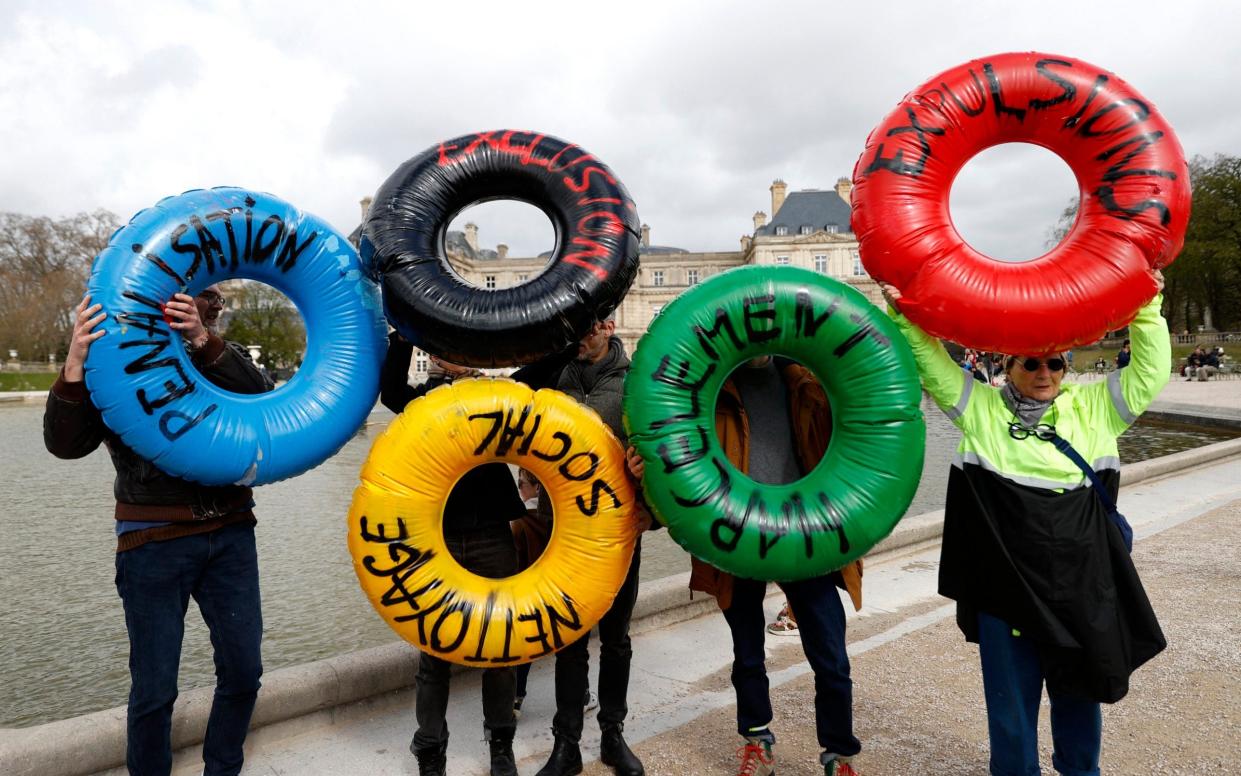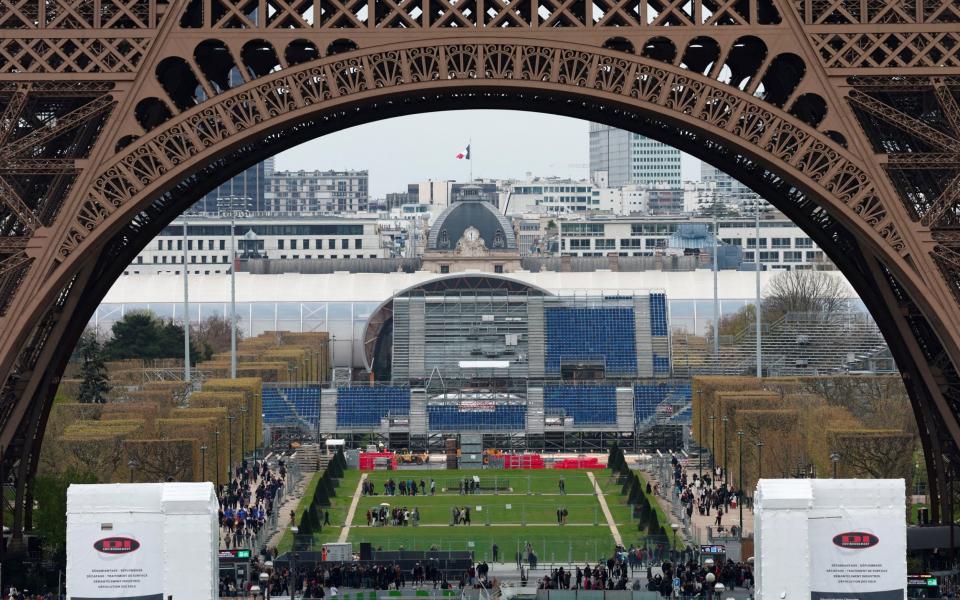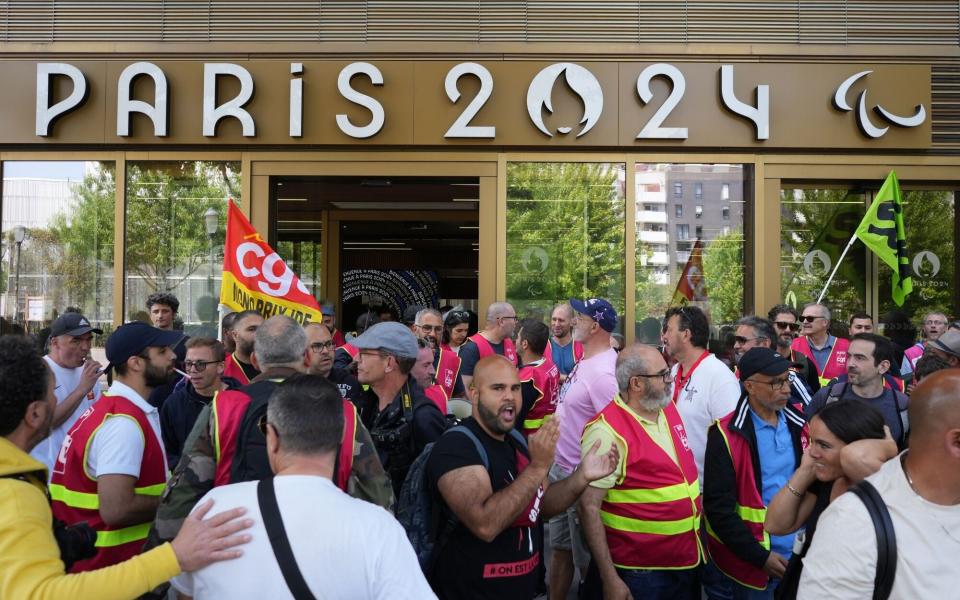Paris Olympics on a collision course with French workers’ summer holidays

- Oops!Something went wrong.Please try again later.
Don’t mess with the French when it comes to their summer holidays.
Known traditionally as les grandes vacances, the month-long August break is especially precious in a country that believes downtime is a human right.
However, this year will be different as tens of thousands of public sector workers will be asked to delay their holidays and work overtime as Paris hosts its first summer Olympics for 100 years.
Given the disruption, French unions have threatened to strike unless Emmanuel Macron and the French government pay up.
CGT, the union representing many rail workers and hospital staff, has already warned that members are willing to walk out during the summer Games.
Sophie Binet, head of the ex-communist union, says thousands of workers will be forced to work longer hours and postpone their holidays.
“We want the government to take immediate action to ensure the success of the Games,” Binet said last month. “For this to happen, our warnings must be heeded and the Games must be prepared from a social point of view.
“We’ve been saying the same thing for months now, and no one cares. It’s getting very tiresome.”
This isn’t Macron’s only headache, as farmers, teachers and police officers have all called strikes in recent weeks.
The French president also faced a bruising battle last year to raise the retirement age from 62 to 64 – one that saw his government narrowly survive a no-confidence vote.
Tony Estanguet, president of the Paris 2024 organising committee for the Olympic and Paralympic Games, is hoping for a smoother ride this summer.
He has pleaded with trade unions not to “ruin the party” by calling strikes during the Games.
Tomasz Michalski, an associate professor at the HEC business school in Paris, says the protests are partly driven by the below-inflation pay rises that they received last year.
“This policy is deliberate on the part of the government because they need to make savings because of the dire budgetary situation,” he says.
Macron has been accused of losing his grip on France’s public finances after the budget deficit surged well above forecasts.
The country borrowed the equivalent of 5.5pc of GDP last year, up from 4.8pc in 2022 and significantly more than the government’s target of 4.9pc.
France can cut spending, raise taxes or pray for growth in order to get borrowing back on a downward trajectory, says Michalski.
However, he adds: “The problem is, growth is rather miserable at the moment so one of the ways the government tried to limit expenditure was saving on wages of the public sector workers”.
Now, he says, many are using the threat of strike action to claw some of those losses back.
The government has already bowed to some demands, promising to pay bonuses of between €500 (£428) and €1,500 to civil servants working directly for the Paris Olympics this summer.
Michalski says others are using the Games as leverage: “The problem for public sector workers is that everybody suffered from high inflation, not just them. So their demands did not raise a lot of sympathy among the rest of the electorate.
“So they really needed something where they could hold the government hostage and the success of the Olympics is absolutely crucial for the image of the country. So this has become a bargaining chip.”
In response, the unions have argued they are not trying to hold the government to ransom.
Maher Tekaya, a top official at the CFDT Union, says: “We will not use the Olympics to try to solve all our problems with the current government.
“This is not at all our idea. We don’t want to spoil the Games. Like all of Paris and France, we are waiting for this very important moment and we don’t want to spoil that moment for anyone.”

But Tekaya echoes Binet’s belief that the Olympics should reflect “exemplary” values in all areas, “particularly” when it comes to social protections.
He believes the Macron government has for too long focused on economics instead of protecting the most vulnerable.
“Every decision they take has just been based on its implication for the economy,” he says. “They have not thought about how to make policies more fair and more equitable, and to put the burden more equally on everyone.”
He warns Macron that the unions remain up for the fight.
“We still have the same majority in government that often show they are deaf to what we are asking for. To have a negotiation we need to have a counterpart that is willing to compromise.”
Tekaya laughs when asked if he believes Macron is doing a good job before adding: “I will say in my own opinion as a trade unionist that we are clearly not satisfied by the reforms he’s implemented so far.
“He said at the start of his second term that he would govern differently. He’s not doing this. He’s not showing a will to listen more to social partners and to civil society. So I’m disappointed.”

Charlotte de Montpellier, an economist at ING warns that Macron, who has sought to burnish his reputation as a safe pair of economic hands since first taking office in 2017, has a difficult balancing act going forward.
De Montpellier has already described France’s deficit targets as “unrealistic”, and ministers have been forced to deny that they are plotting a tax raid to fix public finances.
France has already announced €10bn of spending cuts this year in an effort to reduce its deficit to 4.4pc of GDP and 3pc by 2027. Next year’s saving target may even have to be increased to €20bn.
Michalski at the HEC Paris Business School says Macron has staked his reputation on being able to get borrowing down. “France doesn’t want to lose its credit rating at S&P or Moody’s and these are exactly the figures they’ll be looking at.”
However, De Montpellier says the government is running out of options.
Some have suggested tax rises in France are inevitable, but she highlights: “Taxes are already quite high. So it’s not that there are so many ways that you can easily increase revenues. It’s unclear where they’ll get the money from so it’s hard in this context to see how consensus will be reached.”
A crunch meeting between the government and unions now looms in the coming weeks.
Macron has tried to shift France away from its reputation as a nation of strikers operating in a bloated state.
But with childcare subsidies and higher bonuses already on the table, he may be stuck with both labels by the time his second term ends in 2027.

